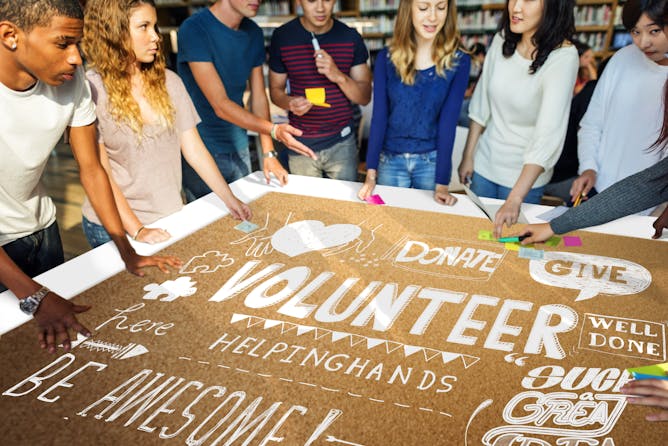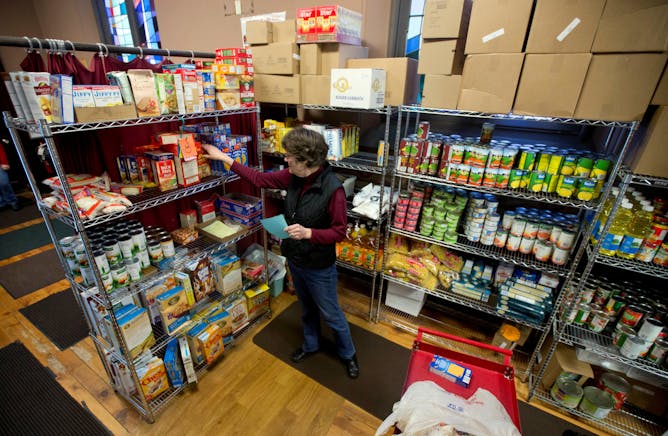Editor's note
|
|
Having trouble choosing among a torrent of Giving Tuesday appeals? There’s a curriculum for that, say three professors who teach about philanthropy. By giving away money (that isn’t theirs) in hands-on “experiential philanthropy” classes, students learn how to use their own money and time to make a difference. And two other scholars identify five things that give people “a taste for charity.”
Many on the right lament the recent rise of white identity politics on websites like Breitbart. But argues journalism professor Sid Bedingfield, these outlets have been around for decades. He tells the story of the white journalists and newspaper editors who exploited the racial resentment of the Civil Rights Era to help build the GOP’s southern firewall.
And did you know that organisms from the simplest bacteria through to people have finely tuned internal clocks that keep their circadian rhythms in sync with Earth’s 24-hour days? University of Maryland Baltimore County Biologists Hua Lu and Linda Wiratan study these circadian clocks in plants and their pathogens and pests, with the hope that insights could eventually improve agriculture, and maybe even lead to specially timed precision medicines for human beings.
|
Emily Schwartz Greco
Philanthropy + Nonprofits Editor
|

|
|
Top stories
|

Academic research and coursework on giving and volunteering are growing more popular.
Rawpixel.com/Shutterstock.com
Jodi Benenson, University of Nebraska Omaha; David Campbell, Binghamton University, State University of New York; Lindsey McDougle, Rutgers University Newark
After taking a class in which they give money away, students get more interested in donating to and volunteering at local nonprofits.
|

Charitable donors may share some common traits.
AP Photo/Mike Groll
Sara Konrath, Indiana University-Purdue University Indianapolis; Femida Handy, University of Pennsylvania
Donors who support charitable causes have a 'taste' for giving, researchers found.
|

Political reporter William D. Workman speaks at a GOP event in 1962.
Courtesy of South Carolina Political Collections, University of South Carolina
Sid Bedingfield, University of Minnesota
In the 1960s, white newspaper journalists exploited racial divisions to help build the GOP's southern firewall.
|

Though not this obvious from the outside, plants are keeping time.
Hua Lu
Hua Lu, University of Maryland, Baltimore County; Linda Wiratan, University of Maryland, Baltimore County
Precisely calibrated timekeepers are found in organisms from all domains of life. Biologists are studying how they influence plant/pathogen interactions – what they learn could lead to human medicines.
|
|
|
|
|
Politics + Society
|
-
Sarah L. Cook, Georgia State University
This story typically has two acts. First come the women's reports of harassment – followed by the inevitable dismissal and undermining of them. Could this time be different?
-
Sophie Bjork-James, Vanderbilt University
There's still far too much we don't know about hate crimes in the US – and that affects how we study and enforce these crimes.
|
|
|
|
Trending on site
|
-
Jean Twenge, San Diego State University
According to a new analysis, the number of US teens who felt "useless" and "joyless" grew 33 percent between 2010 and 2015, and there was a 23 percent increase in suicide attempts.
-
Helen Zoe Veit, Michigan State University
In the 19th century, puddings were as popular and widespread as pasta dishes are today.
-
Jungwoo Ryoo, Pennsylvania State University
The end-of-year shopping whirlwind is underway. How does your credit card issuer watch out for fraudulent purchases on your account amid all those transactions?
|
|
Today’s chart
|
-

 Sophie Bjork-James
Vanderbilt University
Sophie Bjork-James
Vanderbilt University
| |
| |
| |
|
|